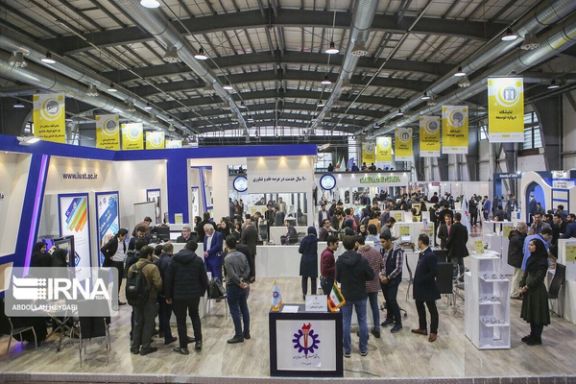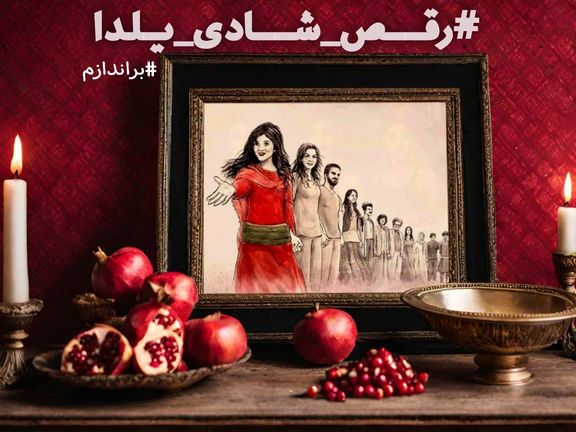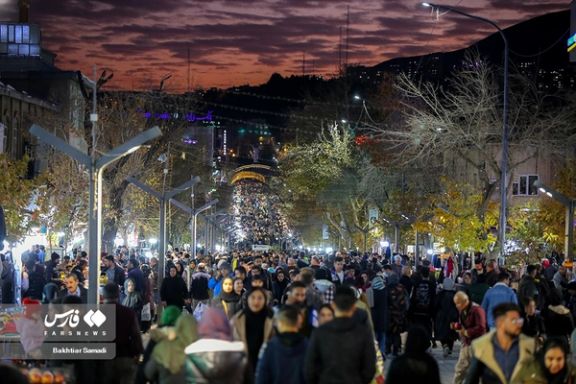Iranian Steel Workers Stage Protest Against Unjust Practices

Pursuing their demands for better work condition, employees of Iran's National Steel Industrial Group rallied and initiated a strike on Saturday in Ahvaz.

Pursuing their demands for better work condition, employees of Iran's National Steel Industrial Group rallied and initiated a strike on Saturday in Ahvaz.
The protest stems from dissatisfaction with the recent termination of positions for 21 workers and the failure to implement job classification plans.
Following the strike, workers vacated the company premises and gathered along the Ahvaz-Khorramshahr road. The protest represents the latest in a series of actions by the Iran National Steel Industrial Group employees. Over the past months, they have intermittently halted work to voice their concerns.
Video is blurred to protect workers' identities
The most recent demonstration occurred on December 20, as workers voiced their opposition to low wages, the non-implementation of job classifications, and management's disregard for their demands. Slogans such as "A worker dies but does not accept humiliation" echoed through the protest.
In a November protest , workers abstained from work for three consecutive days, emphasizing their demands for wage parity and the reinstatement of expelled colleagues.
On September 27, the Islamic Republic's judiciary sentenced 17 protesting workers from the group to imprisonment and fines. They were accused of "disrupting public order through creating disturbance and commotion" during the Iranian people's uprising following the death of Mahsa Amini in custody in 2022.
The Iran National Steel Industrial Group, previously overseen by the Amir Mansour Aria Investment Company, underwent private ownership after legal proceedings and the execution of Aria for embezzlement.
Recent months have witnessed workers from various industries, members of different guilds, and retirees organizing numerous protests to address economic conditions. Several of the gatherings have been met with crackdown by security forces, coupled with legal obstacles for protesters.

Amid dire economic conditions, especially for wage-earners, two Iranian workers hanged themselves at the site of the petrochemical plant that had fired them.
Javad Norouzi and Mostafa Abbasi, two workers from the Ilam petrochemical complex in the province’s Chavar (Chovar) district, attempted suicide in protest against their job terminations. They survived thanks to prompt intervention by their coworkers and were taken to the hospital, but their condition is critical.
Workers in petroleum and petrochemical companies in Iran are particularly vulnerable due to their challenging working conditions and low wages. However, suicide by workers in other industries, as well as teachers, has become a prevalent phenomenon in Iran.
Reports indicate that employees at Chavar have to endure harsh working conditions and receive very low wages. This, combined with the worsening economic situation in Iran, has contributed to unbearable livelihood problems, leading over a dozen other workers to end their lives in the past few years.
A notable issue is the absence of an independent trade union organization for the over 1,000 workers at Chavar Petrochemical Company, most of whom are contracted employees. This lack of job security, insurance, and benefits exacerbates their challenges.
The workers of the company have held several rounds of protests, but their appeals to the labor ministry and governorship have not yielded positive outcomes.
Food prices have risen by more than 80 to 100 percent in recent months, on top of high inflation in the past few years, while most wage earners get less than $200 a month.

While Iranians suffer from the highest inflation rate in decades, with a record devaluation of rial, a lawmaker claims oil exports reached over 1.5 million barrels per day.
Behrouz Mohebbi Najmabadi, a member of parliament’s budget committee, said that when the current administration took office, the country's daily oil sales were 400,000 barrels. “However, by utilizing the capacities of neighboring and special allied countries, such as the Shanghai Cooperation Organization, BRICS, and regional agreements, today Iran's crude oil sales have exceeded 1.5 million barrels per day."
According to Najmabadi, the previous administration sought to raise the country’s crude exports through lifting the sanctions, but President Ebrahim Raisi's government devised a sanctions-neutralization plan in addition to diplomatic pursuit of removing the sanctions.
He claimed that global developments, particularly Europe’s sanctions on Russia over its invasion of Ukraine, was one of the factors contributing to the rise in Iran’s oil sales.
“Today, Iran is experiencing better economic conditions, and economic growth is a result of these developments,” a claim in stark contrast to the realities of life for Iranians who do not see any progress in solving their economic woes.
Earlier in the week, the CEO of the National Iranian Oil Company announced a 60% growth in the country's oil production over the past two years despite global sanctions. Iran’s oil minister Javad Owji claimed last month that the country is producing 3.4 million barrels per day (mb/d) of crude oil.
Despite full US sanctions on Iranian oil exports imposed in May 2019, China remains the primary buyer. Initially, Iran's shipments dropped significantly to around 300,000 barrels per day. However, following the Biden administration's indirect talks with Tehran to revive the JCPOA nuclear deal, Chinese purchases increased. Some observers suggest that the United States has exercised restraint in cracking down, possibly to avoid jeopardizing the prospects of a nuclear deal.

Iran will hold an international exhibit of communication and information technologies next week with only Chinese companies participating, officials said.
Hamed Biazar, an official in charge of the exhibition said that organizers tried their utmost to secure the presence of other countries about the event, but their attempts failed.
Iran is under US and some European sanctions that deter international firms from dealing with the Islamic Republic. Any dealing with Iran could constitute a potential violation of sanctions. Repeated hostage taking of foreign nationals by the Iranian authorities is another factor in drastically reducing travel to the country.
Biazar said that even Russian firms refrained from participating in the exhibition, which left only six Chinese companies as the only foreign entities present.
Another official, however, argued that the absence of foreigners is related to the Christmas holidays but did not explain why Muslim countries are absent.
Iran is also accused of vast cyber disruption activities and sophisticated hacking operations around the world. Microsoft and other major tech companies have repeatedly reported illicit Iranian cyber activities.
The government also has one of the world’s most restrictive internet access policies, with thousands of websites and most major social media sites blocked.
Attendance has declined in similar trade exhibits in recent years. An electronics and computers show last year reportedly attracted 120,000 people while the same event a decade ago brought more than 400,000 people to the venue and many foreign countries and firms were present.

Iranian-American activists say the Chairman of the US Senate Foreign Relations Committee is refusing to advance a bill that codifies sanctions against Iran’s leaders.
The bipartisan Mahsa Amini Human rights and Security Accountability Act (MAHSA Act) passed the House of Representatives with overwhelming majority in September 2023, but has not yet been moved forward for a vote in the Senate.
“Senator Cardin’s office told us they won’t markup bipartisan human rights bill MAHSA Act HR589 that holds leaders of terror regime in Iran accountable for crimes against humanity & funding terrorists,” posted activist Nick Nikbakht on X Thursday. “Killing innocent civilians in Israel, Ukraine & Iran is not enough for Cardin!”
Senator Ben Cardin is a Democrat representing residents of Maryland, a state with a sizable Iranian community. In his long career in the Capitol (first as a Representative then a senator) he has led many legislations related to human rights in Iran. His office’s refusal to move forward the Mahsa Act has therefore baffled many.
“Why are you refusing to mark up a bill that holds the Islamic Republic of Iran’s leaders accountable for their human rights violations, and for supporting Hamas terrorists,” asked another Iranian-American activist on X.
The MAHSA Act is named after the 22-year old Kurdish-Iranian girl who was detained in Tehran for not covering her hair fully. She was beaten in custody and died in hospital on September 16, 2022. Her death sparked country-wide protests, better known as the Women Life Freedom movement, which challenged the regime and its religious authority like never before.
The bill passed the house a year after Mahsa Amini’s death (with 410 voting in favor and only 3 voting against). It requires the executive branch to impose applicable sanctions on Iran’s Supreme Leader Ali Khamenei, the Supreme Leader’s Office and his appointees, Iran’s president and cabinet officials, foundations and other entities affiliated with the Supreme Leader.
It also requires the President to report to Congress every year whether those officials should remain under existing sanctions, making it much harder to lift sanctions for the current and future administrations.
Iranian-American activists have been pushing for this bill to become law ever since it was introduced to the US House of Representatives in the wake of the 2022 protests in Iran. But the legislative road has not been as smooth as they had wished, since the Senate is controlled by Democrats, who seem to be reluctant to take up the bill.
The Democratic Party’s stance on Iran –put on display most visibly by the Biden administration– has been widely and strongly criticized by activists and Republican lawmakers who advocate a tougher approach, especially after the October 7 attacks on Israel by Hamas.
The Biden administration this year allowed $16 billion of frozen funds to be released to the Iranian regime, the largest chunk after the October 7 Hamas attack on Israel that Iran fully supported and praised.
They may not get their way after all. But it won't be for lack of trying.
“Rest assured, we Iranians won’t give up on this bill,” writes another activist, Samie Moazzami on X, addressing Senator Cardin directly. “Is this the legacy you want, to oppose Democrats values of democracy & human rights by NOT sanctioning Iran’s terror leaders?”

Authorities in Iran have resorted to marking the pre-Islamic Winter Solstice festival to placate the people angered by economic crisis and corruption scandals.
Iranian media reported in November that the Supreme Council of Cultural Revolution (SCCR) had renamed certain events on the official calendar including the pre-Islamic winter Festival of Yalda, which millions of Iranians celebrate on the night of December 21 when winter begins.
The council which is tasked with neutralizing non-Islamic cultural influences and ideologies, among other things, had decided that the day of the Winter Solstice be referred to as "Day of Promoting the Culture of Hosting and Connecting with Relatives” in the calendar.
Family of Mahsa (Jina) Amini, remembering their daughter on the longest night of the year.
Many believed that this irrelevant name was an onslaught on the deep-rooted culture and customs of Iranians.
Iran's religious establishment and hardliners often refer to ancient festivals as "pagan" calendar events and sometimes even demand that they should be banned. But despite endless religious propaganda, ancient traditions appear to have gained more popularity since the 1979 Islamic Revolution.

In defiance of the regime, social media users vowed to celebrate their beloved festivals such as Yalda, which they celebrate with family and friends, with even more splendor and merry-making this year, and shared numerous jokes about the lengthy new names assigned to their cherished festivals.
Municipality billboard in Tehran Honoring Yalda
The public's reaction to the renaming of the ancient festivals was so strong that the Council's spokesman, Abbas Mirza Hosseini, had to deny the removal of the names of ancient festivals from the official calendar. He claimed that the new names were only complementary and emphasized the "national identity and Islamic-Iranian culture and civilization."
In the past few days, presumably in response to such criticism, IRIB, which has a monopoly on broadcasting in the country, has shown unprecedented interest in the celebration of Yalda. It has also aired some Yalda entertainment programs including one with stand-up comedian Hassan Reyvandi who had been persona non grata at IRIB for some time.
The municipality of Tehran and some other cities also displayed an unprecedented interest in honoring Yalda. A massive billboard in Tehran’s Vali Asr Square congratulated citizens for Yalda and municipality trucks decorated with balloons and mascots played music on the streets.
The family of a victim of last year’s protests, Erfan Khazaei, celebrated Yalda at his grave.
The celebration of Yalda on the night of Winter Solstice and the Iranian New Year (Nowrouz) on the day of Spring Equinox both date to ancient, pre-Islamic times. The non-Islamic Nowrouz is still the main calendar event for most Iranians. The strength of the Nowrouz tradition is such that even the Supreme Leader Ali Khamenei makes a televised speech on that day.
Iranians send each other millions of text messages to congratulate Yalda just as they do on Nowruz, and increasingly more in recent years, Christmas and western New Year.
“I do not understand the resistance that some [in the religious and political establishment] show against elements that build culture and a sense of national identity,” former government spokesman, reformist politician and sociologist Ali Rabiei wrote in a commentary in Etemad newspaper Thursday entitled “The Indelible Yalda”.
Rabiei opined that introducing a new name for the festival in the calendar was an attempt to obscure the festival’s ancient roots through “historical transformation”. He also urged the regime to stop “engineering cultural calendar events”.
“The pressure of the people and public opinion has forced the Islamic regime to retreat repeatedly in the past 44 years in trying to ban music, short-sleeved clothes, video players, satellite TV, Yalda night, even Nowruz … Don't underestimate your power,” a tweet said.